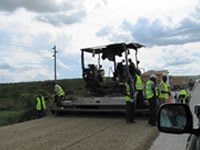 Road transport is by far the dominant mode of transport in Uganda, accounting for over 90 percent of passengers and freight traffic. Roads provide the only means of access to most of the rural communities, therefore effective management of this asset is of vital importance.
Road transport is by far the dominant mode of transport in Uganda, accounting for over 90 percent of passengers and freight traffic. Roads provide the only means of access to most of the rural communities, therefore effective management of this asset is of vital importance.
Uganda’s Ministry of Works and Transport has continued to involve the private sector in road design, construction and maintenance. Generally, improvement or rehabilitation projects and study and design assignments are undertaken by multi-national firms of contractors and consultants.
It is under this aegis that SBI International Holdings AG undertook the reconstruction of the Masaka – Mbarara Road a 155km stretch that is a major highway to the Western Part of Uganda. It is estimated that construction works on this project is due for completion this year 2012, with over 90km of the road already completed and handed over to the government.
Scope of works
In January 2008, the Government of Uganda awarded the contract for the reconstruction of Masaka-Mbarara Road to Reynolds Construction Company Ltd (RCC). SBI International Holdings (AG) Uganda branch with its sister company Reynolds Construction Company (Nig) Ltd (RCC) are part of a Transnational Construction and Development Conglomerate called Shikun & Binui SBI Infrastructure.
The contractor was procured through competitive international bidding under European Union and Government of Uganda procurement guidelines.
The contract amount for the works is around €79million (US$104million). Work commenced immediately and includes concrete drainage works and ancillary works like road marking, installation of guardrails, traffic sign posts. Other works involve widening and strengthening of the carriageway and shoulders, together with associated drainage works, increasing skid resistance of the road, increasing the width of the road on some sections, erecting fences to stop people from crossing, covering open ditches and drainages and erecting traffic warning signs.
The Masaka-Mbarara road is generally made of asphalt concrete. Asphalt has long been the preferred building material for roads and highways in many countries around the world. Asphalt roads have a long life and performance.
They are designed to resist chemicals, oil and weather, and have few weight limitations hence can carry truck overloads. They resist sub grade failure by spreading wheel loads, do not become sticky or fluid as they are unaffected by heat and have better performance in difficult areas where heavy loads and stop-and- start are common. As a result, the road’s strength increases with age. It requires little cleaning, has uniform repairs which are neat and easily accomplished.
The pavement structure, after the earthworks, includes two layers of Crushed Stone Base, a layer of Asphalt DBM (Dense Bitumen Macadam) and another of Asphalt Wearing Course which gives the structure an overall thickness of 60cm.
Impact of the Road reconstruction
The benefits that accrue from the construction are enormous. The reconstruction of the Masaka-Mbarara road has had a positive effect on the economy. Travel times have been reduced tremendously and this is important for promoting agriculture, trade and commerce and socioeconomic development of the rural populace.
For the surrounding communities, employment opportunities have been created. Residents seek employment where they earn a living. More so, SBI/RCC employees are daily customers of the restaurants, markets and shops. Rental houses in Lyantonde town are basically occupied by SBI/RCC employees. Tourism will also benefit greatly since it will take a shorter time to visit tourist sites like Lake Mburo NP, Gorrilla Park in South Western Uganda.
Challenges faced
Each project has its challenges, in terms of complexity and social impact. Specifically for the Masaka-Mbarara road, the tight time schedule to finish 155 km is a big challenge, considering the rains and the daily heavy traffic that uses the road.
Water scarcity has also been one of the biggest challenges faced by the project. The water that has to be used on a daily basis, in order to ensure proper compaction and settling of the murrum, is transported from Lake Mburo.
Theft of construction materials is one of the biggest challenges faced by construction companies in Uganda.
Contractor brief
In 2001 SBI/RCC started operations in Uganda. Since then, the company has constructed over 500km of roads and is currently working on over 424km.
SBI/RCC is backed by its network of sister companies which have been in construction for over 50 years.
The company is able to use its expertise and experience and advise where there is an engineering glitch and offer alternatives that ultimately save money to the clients. The company’s experience and reputation in implementing projects has enabled the company win tenders in Uganda many of which are funded by the Government of Uganda, European Union, African Development Bank, World Bank and other similar Financial Institutions.
The company’s experience and strict working relationship with various partners, suppliers and some subcontractors has enabled them maneuver through the challenges they encounter with considerable ease. As a result, they have been able to deliver a total of 354km of completed road projects which include Jinja-Bugiri, Hima-Kasese-Kilembe, Kasese-Kikorongo and Equator roads, Karuma-Olwiyo, Kagamba-Rukungiri, and Nebbi- Arua roads.
Currently, SBI International is working on a total of 304km roads which include Kampala – Masaka (Package A), Masaka-Mbarara, and Kabale-Kisoro. Of these 158 km has already been handed over to the Client and the rest is due for completion this year.
Thereafter, the company will embark on the Bugiri-Malaba (Design & Build), Kampala – Masaka (Package C), Mbarara-Ntungamo-Kabale Lot 2, and Ntungamo-Kabale- Katuna Lot 3.
The projects undertaken by SBI International clearly reflect the company’s vision of being the leading Construction Company in Uganda providing an array of quality services to a cross-section of clients while supporting the community and fostering economic development in an environment-friendly manner.
